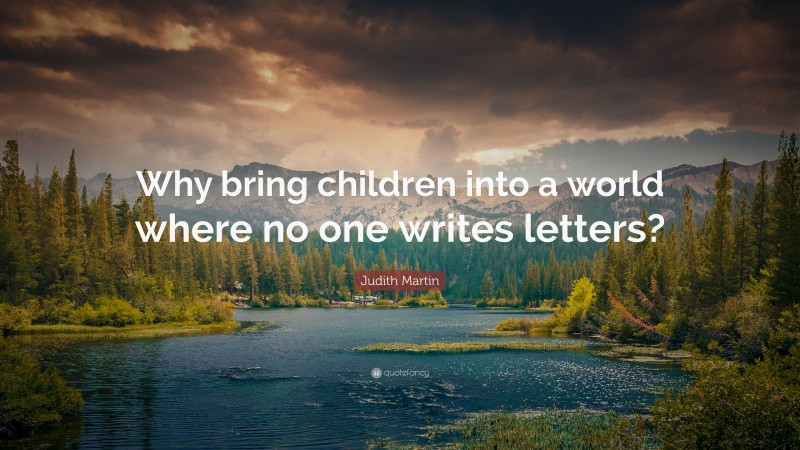The question of procreation in a world often fraught with turmoil and discontent is one that reverberates deeply within the corridors of philosophical inquiry. The Bahá’í teachings present a multifaceted perspective on the profound query: Why bring children into this world? This exploration rests on the foundations of spiritual enlightenment, human development, and the overarching goal of global unity, providing a compelling answer that resonates with both hope and responsibility.
At the core of Bahá’í belief lies a unique metaphor: the world as a garden, flourishing with diversity, each child an exquisite flower awaiting to bloom. Just as a gardener carefully tends to each plant, providing the necessary conditions for growth, so too shall parents nurture their children, equipping them with the tools for a successful and fulfilling life. In this analogy, the act of bringing children into the world is not merely a continuation of lineage but a sacred duty imbued with purpose and transcendence.
First and foremost, the Bahá’í teachings emphasize the innate potential of every child. Each individual is a manifestation of the divine, possessing unique attributes and capabilities designed to contribute positively to society. The act of bringing children into this world thus becomes an exercise in elevating humanity, as parents cultivate the seeds of potential within their offspring. The nurturing environment provided by loving parents allows these young spirits to flourish, ultimately becoming agents of change in their communities and the broader world.
Furthermore, this perspective aligns closely with the Bahá’í principle of the oneness of humanity. In a global landscape often marred by division and conflict, the Bahá’í teachings advocate for the recognition of shared identities among all peoples. Bringing children into this world represents an opportunity to instill values of unity, compassion, and service from an early age. By fostering a worldview that embraces diversity, children are better prepared to navigate the complexities of an interconnected existence, cultivating a deeper appreciation for the myriad perspectives and experiences that color human life.
In contemplating the pros and cons of parenthood, one may naturally encounter fears and uncertainties. The world is, without a doubt, a stage replete with trials, tribulations, and societal ills. Yet Bahá’í teachings frame these challenges not as deterrents but as integral components of the human experience. They serve to heighten resilience, build character, and galvanize a sense of purpose. Each child brought into this world enters a dynamic sphere where they can engage with these challenges, harnessing the lessons of adversity to foster growth and transformation.
Moreover, the Bahá’í Faith passionately promotes the notion of education as a cornerstone of human development. This commitment to education is not limited to mere academic achievement; rather, it encompasses the holistic development of the child. Parents are called upon to model virtues such as integrity, empathy, and humility, thereby fostering an environment where children can cultivate their intellectual and spiritual faculties. By endowing future generations with a well-rounded education, parents create not just learners but leaders, individuals equipped to tackle the pressing concerns of their time.
Indeed, the notion of bringing children into this world resonates with the Bahá’í vision of a collective future where individuals transcend personal aspirations in favor of a shared destiny. The pursuit of individual happiness can often skew our understanding of purpose. Yet within the Bahá’í framework, personal fulfillment is intimately tied to one’s capacity to contribute to the well-being of others. Each child born into this intricate tapestry of existence carries the potential to enhance the collective good, forging connections that transcend traditional boundaries.
As such, the act of procreation is elevated to a sacred mission, one that invites parents to actively engage with the ethical dimensions of parenthood. It calls upon them to nurture qualities that inspire a sense of duty toward humanity—a legacy that extends far beyond temporal existence. For Bahá’ís, the focus on service and altruism becomes paramount, interweaving personal aspirations with the well-being of society. This dual commitment ensures that children are not just prepared for life’s challenges, but are also instilled with a profound sense of responsibility toward the global community.
In conclusion, the profound question of why one should bring children into this world does not elicit a one-dimensional response within Bahá’í teachings. Rather, it opens a dialogue steeped in hope, duty, and enlightenment. Through the metaphor of the garden, we discern the beauty inherent in nurturing the next generation, embracing the complexities of existence, and fostering the conditions for profound personal and societal growth. The Bahá’í encouragement to cultivate the spiritual and moral faculties of children positions them as potential beacons of light amid the prevailing shadows of strife and division in the world. Ultimately, the answer lies not only in the act of introducing new life but in the commitment to raise global citizens dedicated to shaping a more harmonious future.
